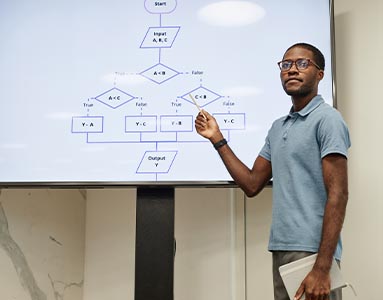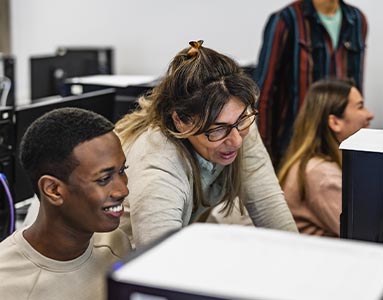Bachelor of Science in Computer Science
ABET PROGRAM EDUCATIONAL OBJECTIVES:
Within 3-5 years after graduation, graduates of the program will:
PEO1: Demonstrate a record of increasing responsibility and contribution to team projects in technical and leadership roles.
PEO2: Communicate ideas effectively to peers, management, external clients and the general public.
PEO3: Engage in local and professional communities that address issues related to the impacts of computing on society.
PEO4: Demonstrate creative problem solving, leveraging established solutions and emerging technologies.
PEO5: Pursue professional growth through advanced degrees, self-directed professional development.

What is Computer Science?
Computer Science graduates are analytical thinkers and problem-solvers who enjoy creating, testing, and improving technology. They complete the program with strong skills in programming, logical reasoning, and collaboration.

Computer Science Careers
Graduates with a degree in Computer Science often pursue careers that involve designing,
building, and maintaining technology systems. They work across industries such as
software development, data analysis, cybersecurity, and IT services, applying their
skills to solve problems and innovate in a rapidly changing field.
Common Careers:
- Software Developer
- Data Analyst
- Cybersecurity Analyst
- Systems Administrator
- Web Developer
- Database Administrator
- IT Consultant
- Research Scientist in Computing

Computer Science Employment Expectations
-
Computer & Information Research Scientists: Projected growth of approx. 20% from 2024 to 2034.
-
Computer Systems Analysts: Expected to grow ~9% between 2024 and 2034.
-
Computer Programmers: Employment projected to decline ~6% over the same period.
-
Computer & Information Systems Managers (IT managers): Projected growth ~ 15% from 2024 to 2034.

Computer Science Frequently Asked Questions (FAQs)
Q: How much math is required in the Computer Science program?
A: Students take several math courses—including calculus, discrete mathematics, and probability/statistics—because
these subjects build the logical and problem-solving foundation needed for advanced
computing.
Q: What kind of hands-on experiences can I expect during the program?
A: In addition to programming labs, students complete real-world projects, team-based
assignments, and a capstone project that mirrors industry practices. Many also take
part in internships or undergraduate research.
Q: What is the difference between Computer Science, Computer Information Systems,
and Information Technology?
A: Computer Science focuses on the theory and design of computing systems and software.
Computer Information Systems blends computing with business applications, emphasizing
how technology supports organizations. Information Technology centers on managing
and supporting hardware, networks, and systems to keep technology running smoothly.
Are you thinking about pursuing a career in Computer Science? Our program prepares students to become highly-trained Computer Scientists.
If you are thinking of majoring in Computer Science, consider what some of our own Rattlers had to say about FAMU's Computer Science program, what inspired them, and why they chose Computer Science as a career.
I love my degree program because it set me up for success once I entered into the working world. In today’s society, everything is becoming digital and relying on technology, so to be a step ahead of that and already have pertinent knowledge that not the average person would sets you a part tremendously not only on job interviews, but in every day activities with technology as well.
Learn about our Computer Science Masters Degree Program
Department of CIS Faculty
|
Name |
|
Phone |
|
Jerry Miller |
850-599-3022 | |
|
Clement Allen |
(850) 599-3050 | |
| Hongmei Chi Professor |
||
| Vanessa Coote Instructor/CS Program Coordinator |
(850) 412-7353 | |
| Jon deGoicoechea Associate Instructor |
(850) 599-3961 | |
| Deidre W. Evans Professor |
(850) 599-3964 | |
| Bobby Granville Associate Professor |
(850) 412-7360 | |
| Edwina Jacobs Associate Instructor/IT Program Coordinator |
(850) 412-7351 | |
| Edward Jones Professor and Associate Chairperson |
(850) 412-7349 | |
| Jinwei Liu Assistant Professor/CIS Program Coordinator |
(850) 599-8647 | |
| Bhanu Prasad Professor |
(850) 412-7359 | |
| Yohn Jairo Parra Bautist Assistant Professor |
(850) 599-8647 | |
| Idongesit Mkpong-Ruffin Associate Professor/Cybersecurity Program Coordinator |
(850) 599-3042 | |
| Samuel Erskine Assistant Professor |
(850)-599-8899 | |
| Carlos Theran Assistant Professor |
850-443-9879 |






